Hiring the right person can be a challenging task for any business. Surprisingly, around half of recruiting companies end up with hires who aren't the best fit or lack the necessary skills. The consequences of these missteps can be incredibly costly.
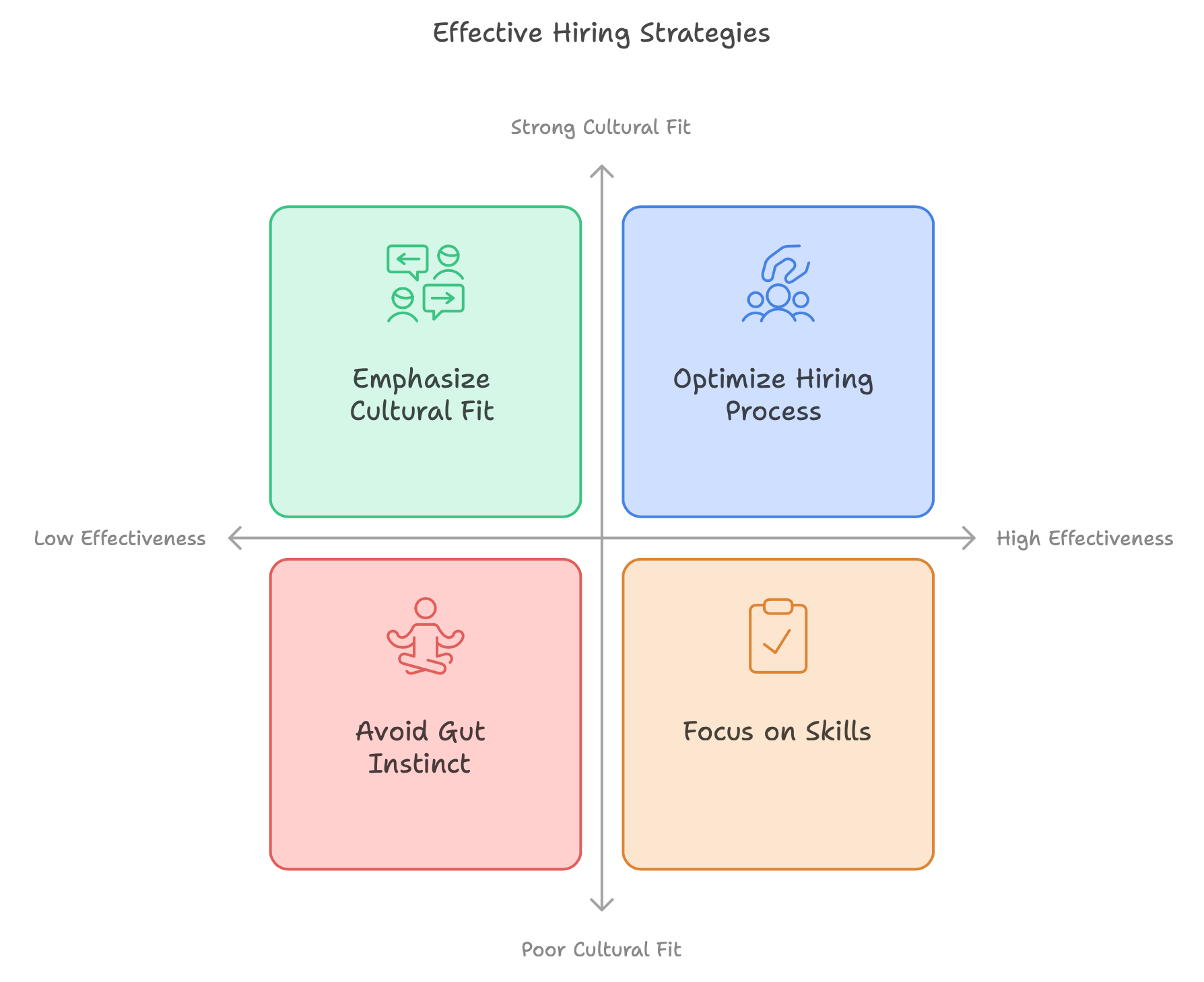
This resource delves into the essential mindset and preparation required before initiating the hiring process, equipping you with a comprehensive set of interview questions and approaches. By incorporating these strategies, you will develop the confidence and expertise necessary to identify the ideal candidate for your organization.
One of the articles I recommend you to read together with this one is The Science of Talent Acquisition: How Structured Evaluation Predicts Success - it discovers detailed approach to trending and efficient hiring methods, including Psychology.
The High Cost of Hiring Mistakes: Why Gut Instinct Isn't Enough
The hiring process is often overlooked or approached with a trial-and-error mindset, but the reality is that hiring mistakes can have catastrophic consequences. Onboarding a new employee can be an arduous task, and making poor hiring decisions not only leads to financial losses but also requires additional efforts to rectify the situation.
Studies reveal that a typical hiring mistake can cost a company approximately fifteen times the monthly salary of the employee. These costs arise from both the employee's poor performance and the necessary actions to terminate their employment and find a replacement. To put it into perspective, hiring a manager earning $100,000 a month and subsequently realizing it was a wrong choice can result in a staggering $1.5 million loss for the company.
Studies reveal that a typical hiring mistake can cost a company approximately fifteen times the monthly salary of the employee. These costs arise from both the employee's poor performance and the necessary actions to terminate their employment and find a replacement. To put it into perspective, hiring a manager earning $100,000 a month and subsequently realizing it was a wrong choice can result in a staggering $1.5 million loss for the company.
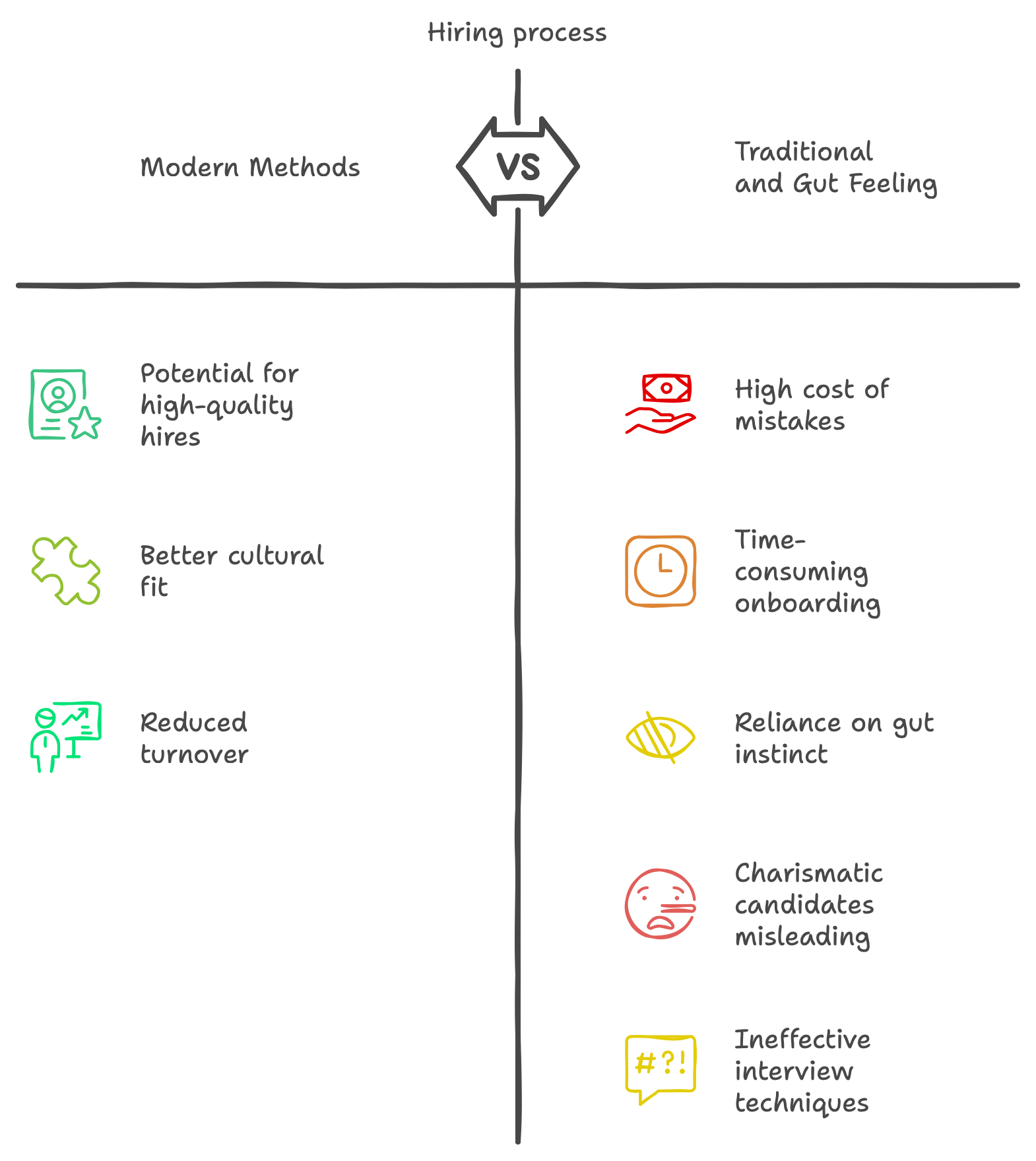
Despite the high costs associated with hiring mistakes, they remain a common occurrence. In fact, renowned management expert Peter Drucker suggests that most managers make at least 50 percent of their mistakes during the hiring process. This can be attributed to the lack of skills among business professionals to make informed hiring decisions, leading them to rely on gut instinct rather than expertise.
Relying solely on instinct when evaluating candidates is comparable to being an amateur art critic with limited responses of "I like it" or "I don't like it." This approach can be easily misled by charismatic candidates who may lack the essential qualifications. On the other hand, some managers adopt a prosecutorial approach, attempting to catch candidates off guard, which impedes the exploration of their true job-related skills.
I recommend you to read the article about why and how ask questions utilizing critical thinking in Talent Acquisition: Critical Thinking Helps Resist Manipulation
Defining Hiring Needs and Prioritizing Cultural Fit: Keys to Successful Recruitment
Fortunately, there is a better approach to hiring.
Defining your hiring needs is crucial to ensure successful recruitment. Similar to not hiring an unlicensed contractor for a kitchen remodel, you should not hire candidates without a clear understanding of the qualifications required for the role. It is essential to establish your hiring criteria from the beginning.
Often, recruiters overlook the importance of defining their hiring requirements, leading to potential pitfalls in the hiring process. To mitigate these challenges, it is crucial to have a clear and precise understanding of the qualities and qualifications you are seeking in a candidate.
Defining your hiring needs is crucial to ensure successful recruitment. Similar to not hiring an unlicensed contractor for a kitchen remodel, you should not hire candidates without a clear understanding of the qualifications required for the role. It is essential to establish your hiring criteria from the beginning.
Often, recruiters overlook the importance of defining their hiring requirements, leading to potential pitfalls in the hiring process. To mitigate these challenges, it is crucial to have a clear and precise understanding of the qualities and qualifications you are seeking in a candidate.

When hiring without clear needs. Without specified requirements and clear expectations for the role, there is a risk of hiring a generalist who may lack the specific skills and expertise needed. Hiring all-round candidates may seem impressive, but it is one of the common mistakes made in recruitment. Neglecting to inquire about essential and specific skills can have negative consequences.
Clearly defining your hiring needs is essential to ensure that you find the candidate with the specific skills, qualities and mindset required for the role and aligns with your business objectives.
The cultural fit of a candidate is often more significant than their skills alone when it comes to their suitability for your company. Recruiters should acknowledge the importance of social skills in addition to intellect and expertise. Specifically for this topic I recommend you to read two articles: How to Assess Cultural Fit of a Candidate During an Interview? and Questions to Assess Cultural Fit of a Candidate.
Revamping the Hiring Process: Prioritizing Cultural Fit and Modern Interview Techniques
To ensure successful integration of new hires, understanding your company's culture is crucial. Surprisingly, during interviews with CEOs, we discovered that one-third of them admitted to making significant hiring mistakes by neglecting the importance of cultural fit. Here is our article on this matter: Why hiring right people can't work without clear and explained culture
To avoid this pitfall, it is essential to define your company culture from the outset. Get your leadership team together and have them explain what the company's working environment is like. No need for elaborate definitions; quick, off-the-cuff descriptions will suffice. In many cases we see that company values are declared, but in reality not followed, here is our thoughts on how to change it.
For example, one of our clients defined his company culture with catchwords like "analytical, dynamic, fast, and informal." This clarity helped them identify candidates who would thrive in an environment aligned with those characteristics.
But making sure there's a cultural fit might mean turning down candidates with exceptional skills. It's important to remember that a candidate may excel at their job but not share your company's values. Ultimately, your company culture holds greater significance. Thus, prioritizing cultural fit ensures a harmonious and cohesive work environment, even if it means passing on highly talented individuals who may not align with your company's values and culture.
To avoid this pitfall, it is essential to define your company culture from the outset. Get your leadership team together and have them explain what the company's working environment is like. No need for elaborate definitions; quick, off-the-cuff descriptions will suffice. In many cases we see that company values are declared, but in reality not followed, here is our thoughts on how to change it.
For example, one of our clients defined his company culture with catchwords like "analytical, dynamic, fast, and informal." This clarity helped them identify candidates who would thrive in an environment aligned with those characteristics.
But making sure there's a cultural fit might mean turning down candidates with exceptional skills. It's important to remember that a candidate may excel at their job but not share your company's values. Ultimately, your company culture holds greater significance. Thus, prioritizing cultural fit ensures a harmonious and cohesive work environment, even if it means passing on highly talented individuals who may not align with your company's values and culture.
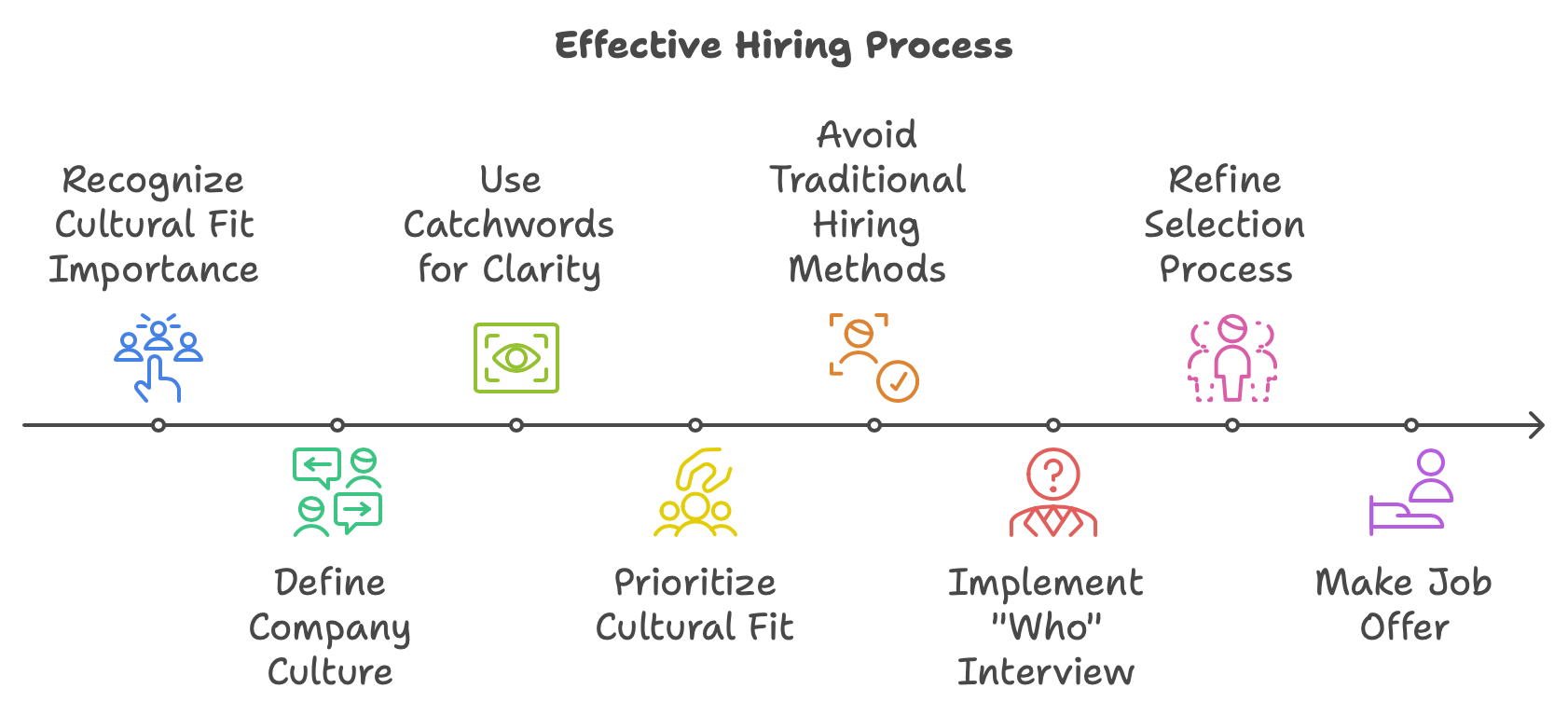
Outdated (traditional) hiring methods can be easily refreshed to enhance the process and bring about improvements. Many billion-dollar firms consider hiring as a critical business operation, yet for most companies, it remains a sporadic activity.
The main flaw lies in traditional methods that start searching for new employees only when there is an urgent requirement. Under the pressure of time constraints, the hiring team is more likely to make hasty decisions and hire the wrong person. Moreover, managers often reach out to the HR team when they anticipate a vacancy, leading to selecting candidates from the pool of available options instead of actively seeking out the very best candidates.
Our methods include a few interesting approaches and active search for candidates. You can read more details following the link.
One approach you can use is the "who" interview. By diligently investigating your candidates through a series of interviews, you can uncover the perfect person for the job. While the screening interview narrows down the pool, the next step is the "who" interview, which delves deeper into the candidate's background and character.
The "who" interview is based on a method developed by Brad Smart, a renowned management psychologist. It involves asking detailed questions about the candidate's career, including successes, failures, and relationships with bosses and colleagues. This in-depth interview provides a comprehensive understanding of the candidate's qualifications and suitability for the role.
Once you have selected promising candidates based on the "who" interviews, the next two interviews further refine your assessment. The focused interview examines the candidate's capabilities in relation to the specific tasks and requirements of the job. It enables a reassessment of their skills and allows for follow-up questions based on previous interviews. Once these interviews are done, you'll be ready to make an offer to the selected candidate.
How to Win Over Candidates: Selling the Job, Culture, and Lifestyle
If the candidate turns down the job offer...
To ensure a successful hire, it's crucial to sell the candidate on the job by demonstrating how well it aligns with their skills and lifestyle. Convincing the candidate that the position is a perfect fit will increase their motivation and likelihood of success.
Often, recruiters prioritize evaluating of suitability of the candidate for the job and overlook the significance of considering the candidate's perspective. However, by understanding and addressing the candidate's needs, you can enhance the attractiveness of the job offer. This involves considering the candidate's skills, personality, and work style to ensure a strong alignment.
To ensure a successful hire, it's crucial to sell the candidate on the job by demonstrating how well it aligns with their skills and lifestyle. Convincing the candidate that the position is a perfect fit will increase their motivation and likelihood of success.
Often, recruiters prioritize evaluating of suitability of the candidate for the job and overlook the significance of considering the candidate's perspective. However, by understanding and addressing the candidate's needs, you can enhance the attractiveness of the job offer. This involves considering the candidate's skills, personality, and work style to ensure a strong alignment.
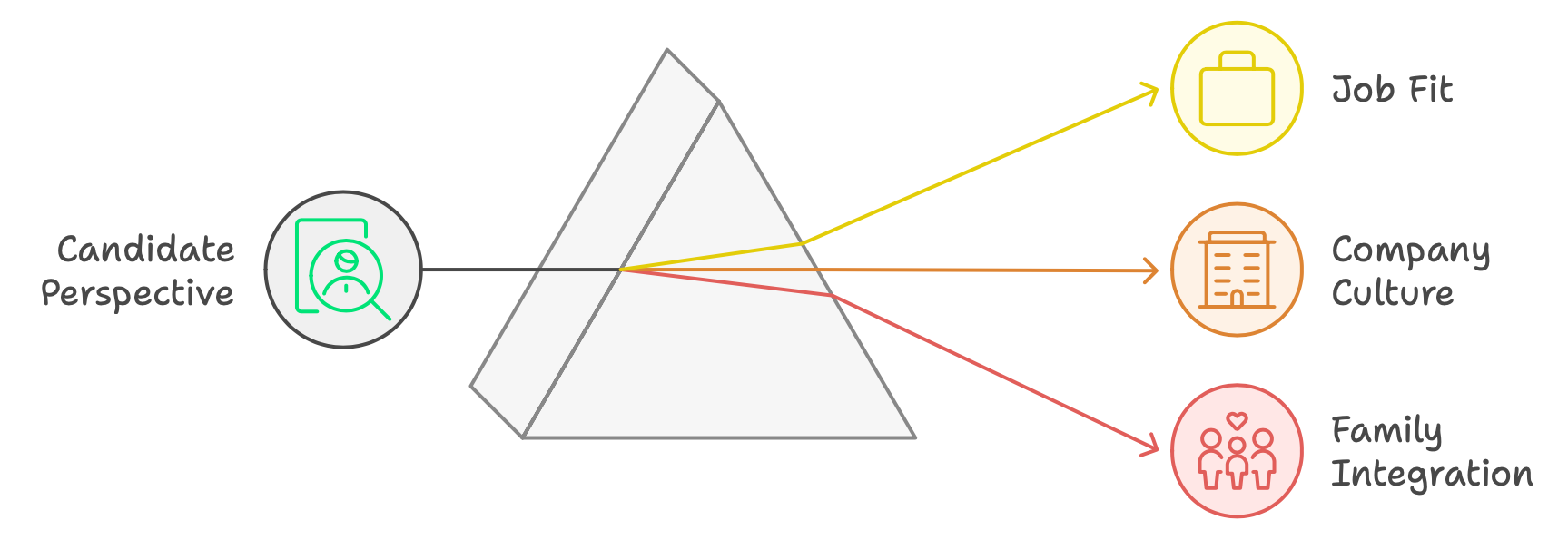
In addition to evaluating the job fit, it's important to sell the candidate on the company culture and environment. This involves sharing information about the company's vision, goals, and values, as well as discussing the behavioral dynamics within the organization. By making the candidate feel included and emphasizing their alignment with the company culture, they are more likely to feel welcomed and motivated to contribute.
Furthermore, considering the candidate's family life is important. This goes beyond offering flexible schedules; it involves creating a family-friendly company culture where families are integrated into the workplace. By fostering connections with the families of new employees, inviting them to company events, and creating a welcoming environment, you can strengthen the candidate's feeling of belonging and satisfaction within the company.
By focusing on both the professional and personal fit, you can effectively sell the job to the candidate and increase the chances of a successful and fulfilling long-term partnership.
Embedding Hiring into Your Company Culture: A Key to Long-Term Success
Making hiring a part of your company culture is crucial for building a successful organization. To achieve this, you need to prioritize people and emphasize the importance of hiring within your management team. Effective managers allocate a considerable portion of their time to consider the well-being and development of both current and future employees.
Improving your hiring methods requires more than just mentioning hiring in meetings. Engage your team in discussions about the importance of hiring and provide materials on the subject. Organize workshops to provide your team with valuable training in networking and talent identification techniques.
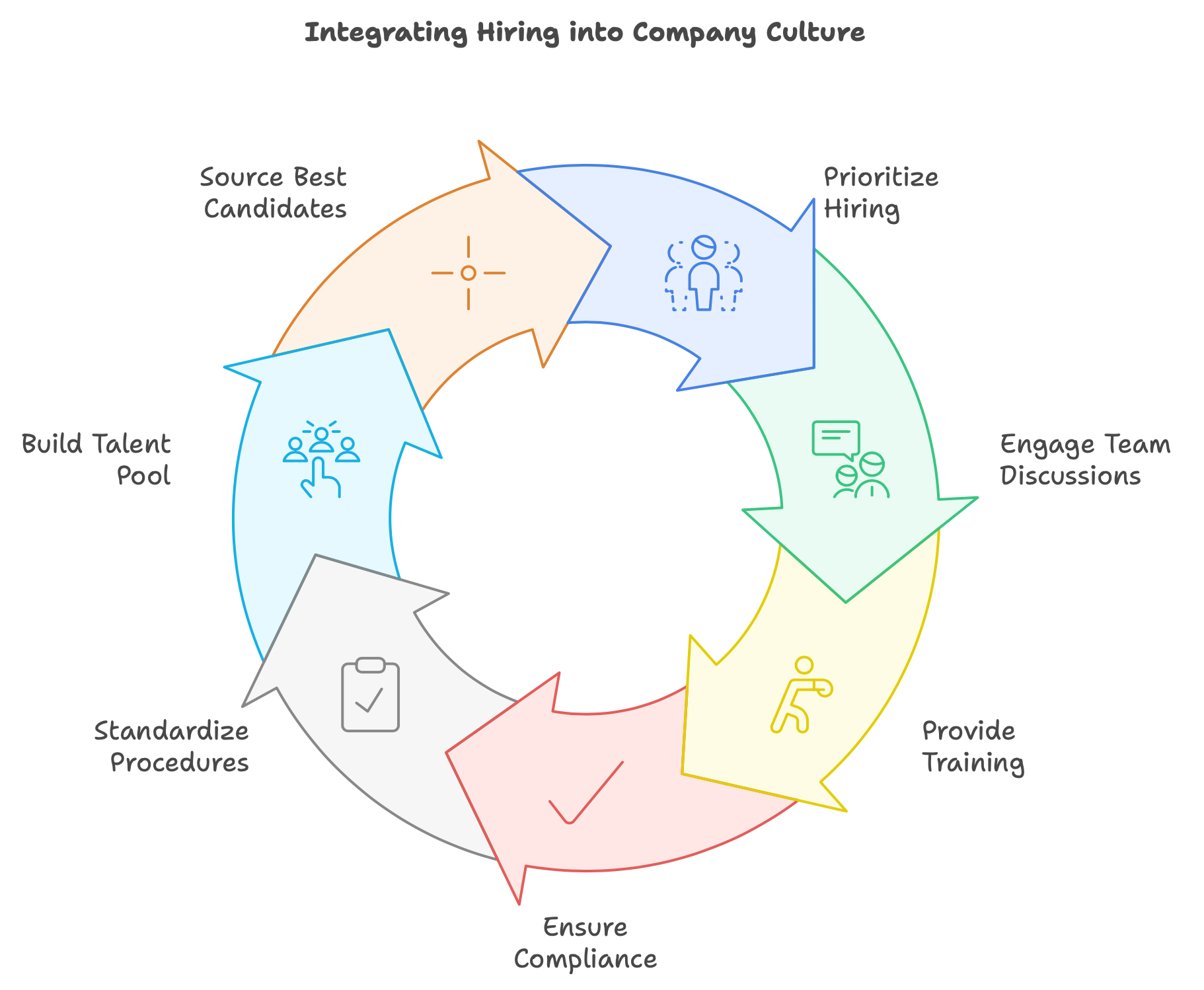
While creativity in the hiring process is encouraged, it's important to ensure compliance with legal restrictions. Conduct candidate evaluations based on relevant criteria, ensuring fairness and avoiding personal biases. Maintain a standardized hiring procedure to ensure equal treatment for all candidates, without any disparities based on demographics.
By building a talent pool and sourcing the best candidates for your company, you'll set your organization on the path to incredible success. Remember, hiring exceptional people is a vital component of achieving your business goals.
UnitiQ Fractional HR Services and Talent Acquisition Solutions: Empowering Businesses to Hire Right
UnitiQ offers innovative Fractional HR Services and Talent Acquisition Solutions designed to help companies avoid costly hiring mistakes. With a focus on structured, data-driven hiring methods, UnitiQ ensures that businesses don't fall into the common trap of relying solely on instinct or time-sensitive decisions.
By working closely with management teams, UnitiQ integrates talent acquisition into the core of company culture, prioritizing cultural fit, skills alignment, and long-term success.
From conducting thorough "who" interviews to helping businesses create a family-friendly work environment, UnitiQ provides the expertise needed to build a robust talent pool and hire the best candidates for sustained organizational growth.
Contact me, Olga Fedoseeva, Fonder at UnitiQ, directly for getting a special offer tailored to your Talent Acquisition Needs:
My Telegram
My LinkedIn
Some related articles to read:
How Fractional HR and Flexible Work Schedules Enhanced Talent Acquisition at Charge
Building High-Performance Teams: Mastering A-Player Talent Acquisition and People Management
Scaling Smart: How UnitiQ Helps In-House HR Teams Overcome Key Challenges
6 Key Use Cases Where Fractional HR Solutions Drive Business Growth
By working closely with management teams, UnitiQ integrates talent acquisition into the core of company culture, prioritizing cultural fit, skills alignment, and long-term success.
From conducting thorough "who" interviews to helping businesses create a family-friendly work environment, UnitiQ provides the expertise needed to build a robust talent pool and hire the best candidates for sustained organizational growth.
Contact me, Olga Fedoseeva, Fonder at UnitiQ, directly for getting a special offer tailored to your Talent Acquisition Needs:
My Telegram
My LinkedIn
Some related articles to read:
How Fractional HR and Flexible Work Schedules Enhanced Talent Acquisition at Charge
Building High-Performance Teams: Mastering A-Player Talent Acquisition and People Management
Scaling Smart: How UnitiQ Helps In-House HR Teams Overcome Key Challenges
6 Key Use Cases Where Fractional HR Solutions Drive Business Growth








